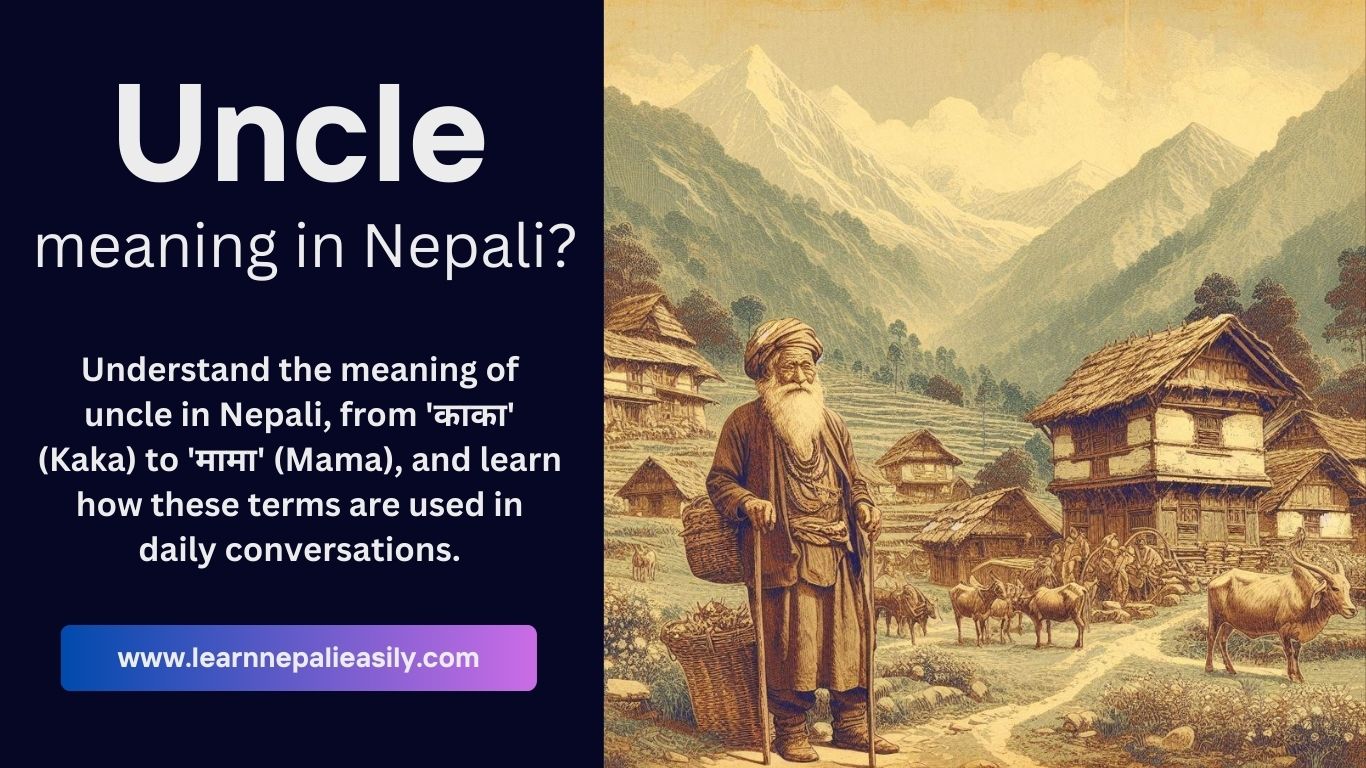The word “uncle” is used in various ways in English, depending on the familial relationship it describes. Nepali culture also has different terms for uncles based on whether they are on the mother’s side or father’s side of the family. Understanding these terms can help you navigate conversations with relatives and understand the cultural importance of family relationships in Nepal.
In this post, we’ll explore the Nepali words for uncle, how they are used in everyday conversation, and the significance of these relationships in Nepali culture.
What is the Meaning of “Uncle” in Nepali?
The English word “uncle” has multiple translations in Nepali, depending on the specific relationship:
- “काका” (Kaka): Father’s younger brother
- “ठुलो बुवा” (Thulo Buwa): Father’s elder brother
- “मामा” (Mama): Mother’s brother
- “फुपाजु” (Phupaju): Father’s sister’s husband
Each term conveys a specific relationship to the speaker. These distinctions are crucial in Nepali, as family relationships are highly valued, and addressing relatives correctly shows respect and understanding of familial ties.
Different Contexts for Using “Uncle” in Nepali
Below are examples of how the word “uncle” is used in common Nepali sentences.
- Father’s Younger Brother – काका (Kaka)
Sentence: “मेरो काका धेरै मेहनती हुनुहुन्छ।” (Mero kaka dherai mehenati hunuhuncha.)
Translation: “My uncle (father’s younger brother) is very hardworking.”
Here, “काका” (Kaka) is used to refer to the younger brother of the speaker’s father.
- Father’s Elder Brother – ठुलो बुवा (Thulo Buwa)
Sentence: “ठुलो बुवा हरेक साल हामीलाई भेट्न आउनुहुन्छ।” (Thulo buwa harek saal hamilai bhetna aaunuhuncha.)
Translation: “My uncle (father’s elder brother) visits us every year.”
“ठुलो बुवा” (Thulo Buwa) refers to the elder brother of the father in a respectful manner.
- Mother’s Brother – मामा (Mama)
Sentence: “मेरो मामा काठमाडौंमा बस्नुहुन्छ।” (Mero mama Kathmanduma basnuhuncha.)
Translation: “My uncle (mother’s brother/maternal uncle) lives in Kathmandu.”
In this sentence, “मामा” (Mama) is the term used to address or refer to the brother of the speaker’s mother.
- Father’s Sister’s Husband – फुपाजु (Phupaju)
Sentence: “फुपाजु सधैं हाम्रो परिवारको साथमा हुनुहुन्छ।” (Fupaju sadhai hamro pariwarko saathma hunuhuncha.)
Translation: “My uncle (father’s sister’s husband) is always with our family.”
“फुपाजु” (Phupaju) is the term for the husband of the father’s sister, another type of uncle in Nepali.
Cultural Significance of Uncle in Nepali Families
In Nepali families, the role of an uncle is significant, and uncles are often seen as mentors, protectors, and important members of the extended family. The respect given to an uncle, whether on the maternal or paternal side, highlights the importance of familial bonds in Nepali culture.
Uncles are often involved in major family decisions and ceremonies, such as weddings and religious rituals. In joint family systems, uncles can also play a crucial role in the upbringing of children.
Common Nepali Phrases Involving “Uncle”
Here are some useful Nepali phrases that involve the term “uncle”:
“मामा, तपाईं कहिले आउँदैहुनुहुन्छ?” (Mama, tapai kahile audaihunuhuncha?)
Translation: “Uncle, when are you coming?”
“काका, कृपया मलाई मद्दत गर्नुहोस्।” (Kaka, kripaya malai maddat garnuhos.)
Translation: “Uncle, please help me.”
“ठुलो बुवा, तपाईंलाई नभेटेको धेरै दिन भयो।” (Thulo buwa, tapailai nabhetayko dherai din bhayo.)
Translation: “Uncle, it’s been a long time since I saw you.”
Tips for Using Uncle in Nepali Conversations
- Know the Specific Term: Understanding which type of uncle you’re referring to is essential in Nepali, as each has a distinct term.
- Use Respectful Language: Uncles, like all elders in Nepali culture, should be spoken to with respect. Add “हजुर” (Hajur) for politeness.
Conclusion
In Nepali, the word for “uncle” varies based on the familial relationship and side of the family, such as “काका” (Kaka), “मामा” (Mama), and “ठुलो बुवा” (Thulo Buwa). These distinctions are a reflection of the importance Nepali culture places on family roles and relationships. This guide helps you understand how to refer to your uncles in Nepali correctly, ensuring you navigate family conversations with respect and cultural sensitivity.

